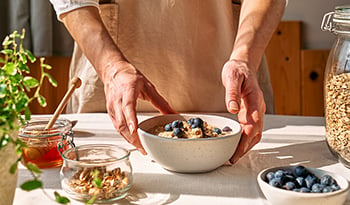Starting a Heart-Healthy Diet: Here's What You Need to Know

Ischemic Heart disease, or heart disease caused by lack of blood flowing to the heart muscle tissue, represents the leading cause of death worldwide and accounted for almost 9 million deaths in 2019. With 16% of the world’s deaths attributed to heart disease, heart disease also signifies the fastest-growing cause of death : increasing by more than 2 million deaths since the year 2000.
Ischemic heart disease typically occurs by the narrowing of the coronary arteries that feed the heart due to plaques forming on the artery walls. Plaques mostly form from poorly controlled lipid and cholesterol levels circulating in the blood. A diet high in fat and animal protein mainly contributes to elevated lipid levels. A sedentary lifestyle, chronic inflammation, and lack of exercise also contribute to the development of heart disease.
Several types of heart disease can be caused by a variety of reasons. Most people can decrease their risk of developing heart disease by changing lifestyle habits for the better. Diet, exercise, and dietary supplements can all have a positive impact on your heart health.
Staples of a Heart-Healthy Diet
Many foods have heart health benefits that taste great too. Let’s take a look at a variety of fruits, vegetables, grains, meats, nuts, and other foods that rank high on the heart-healthy list.
Heart-Healthy Fruits
- Avocado – Since ischemic heart disease typically begins with a diet high in saturated fat, avocado offers a healthy fat alternative for those looking to start a heart-healthy diet. Full of monounsaturated fats linked to reduced low-density lipoprotein (LDL) cholesterol levels (or bad cholesterol) and decreased risk of heart disease, avocados remain ideal for a healthy heart diet. Rich in potassium, this green, and oily fruit could help reduce blood pressure and risk for heart attack and stroke.
- Berries – High in anthocyanins and other powerful antioxidants, berries help to protect against inflammation and oxidative stress that contribute to an eventual diagnosis of heart disease. Various studies show a reduction in “bad” LDL cholesterol and systolic blood pressure with regular consumption of berries. Studies also show that eating blueberries daily improves the function of cells in the blood vessel wall lining. This in turn could help to control blood clotting.
- Bananas – An ideal source of magnesium and potassium, both minerals essential to heart health, bananas can help lower blood pressure, a significant risk factor for heart disease. Although most people do not get enough potassium in their diet, a diet rich in potassium lowers heart disease risk by up to 27%.
Heart-Healthy Vegetables
- Leafy Green Vegetables – Full of vitamins and minerals, leafy green veggies like greens, kale, spinach, and cabbage remain high in antioxidants, which protect the heart. Their high levels of nitrates and vitamin K help to reduce blood pressure, protect the arteries, and decrease arterial stiffness.
- Garlic – Yes, garlic is technically a vegetable. A heart-healthy vegetable thanks to its high levels of allicin, a compound study shows it can help reduce blood pressure and cholesterol levels. Garlic also helps to inhibit platelet buildup, which can lead to blood clotting and stroke.
Heart-Healthy Grains
- Whole Grains – Higher in fiber than refined grains, whole grains have been found to benefit heart health. Whole grains such as brown rice, oats, rye, quinoa, and whole wheat can reduce “bad” LDL cholesterol and risk for heart disease.
Heart-Healthy Meats
- Salmon – High in omega-3, studies show eating salmon three times a week for eight weeks decreased diastolic blood pressure significantly. Studies also show eating salmon and other fatty fish like tuna, mackerel, and sardines lowers total cholesterol, fasting blood sugar, and systolic blood pressure.
- Fish oil supplements have also been shown to have heart-healthy benefits such as improved arterial function with reduced blood lipids and blood pressure.
Heart-Healthy Nuts and Seeds
- Walnuts – Studies show eating walnuts can reduce “bad” LDL cholesterol, decrease inflammation, and lower blood pressure : thereby reducing the risk for heart disease.
- Almonds – Full of fiber and monounsaturated fats, almonds offer a heart-healthy treat that can reduce cholesterol and belly fat : both factors that contribute to heart disease.
- Hemp Seeds – High in the amino acid arginine, hemp seeds get associated with reduced inflammatory markers found in the blood : a contributing factor to heart disease.
- Flaxseeds – Shown to reduce total cholesterol and “bad” LDL cholesterol levels, flaxseeds offer a great heart-healthy seed to add to salads, nut butters, or cereals. Flaxseeds have also been shown to decrease blood pressure, a significant factor in heart disease.
Heart-Healthy Legumes
- Soybeans – Rich in isoflavones, soybeans may help lower cholesterol levels. Edamame, an immature soybean, also offers a good source of fiber and antioxidants : both heart-healthy nutrients.
- Pinto Beans – Fermented by your good gut bacteria, pinto beans reduce “bad” LDL cholesterol and blood triglycerides.
A Heart-Healthy Lifestyle
Along with incorporating heart-healthy foods, making meaningful lifestyle changes can boost heart health and reduce your risk of heart disease.
Diet
Replacing a meal with a protein shake can help reduce your consumption of dietary cholesterol while keeping your protein intake sufficient. Reducing dietary cholesterol can help lower your risk for coronary artery disease and eventually ischemic heart disease.
Exercise
A sedentary lifestyle contributes greatly to heart disease. Sitting represents “the new smoking,” and heart disease rates continue climbing. A cardio workout, or aerobic exercise, remains the best option for improving heart health. Examples of aerobic exercise include walking, running, swimming, jumping rope, tennis, and cycling.
Doctors recommend at least 150 minutes of moderate aerobic exercise each week. That breaks down to just 30 minutes of activity a day, a minimum of 5 days a week.
The key to strengthening your heart while exercising remains moving fast enough to raise your heart rate and breathing rate. To make sure that you don't overdo it, you should still be able to talk to someone while exercising.
Reduce Stress
Stress, “the silent killer,” contributes to heart disease around the globe. Long-term stress leads to high levels of cortisol circulating in the blood. Increased cortisol levels contribute to higher cholesterol, blood pressure, and blood sugar levels : all common risk factors for heart disease.
Stress also promotes the build-up of plaque on the arterial walls, a leading factor in heart disease diagnosis.
Stop Smoking
Studies have shown that smoking contributes to glucose intolerance and low levels of “good” high-density lipoprotein (HDL) cholesterol in the blood, both having negative impacts on heart health. Smoking has also been connected to cerebral vascular disease, as well as ischemic heart disease.
4 Supplements to Support Heart Health
Vitamin D
Research has identified vitamin D deficiency as a risk factor for heart attacks, peripheral artery disease, and congestive heart failure. Vitamin D deficiency remains common as people spend less time outdoors in the sun. When sunlight contacts the skin, vitamin D synthesis occurs.
Taking a vitamin D supplement may help reduce your risk of heart disease if deficient. Ask your doctor to check your levels before beginning a vitamin D supplement to avoid toxicity.
Coenzyme Q10
Better known as CoQ10, it has heart health benefits including reduced risk of repeat heart attack, improved outcomes for patients with congestive heart failure, and lower blood pressure.
CoQ10 also combats unwanted side effects of statins, medications that lower cholesterol levels, muscle pain, and weakness. Studies also show CoQ10 raises “good” HDL cholesterol levels, yet another heart health benefit.
CoQ10: The Best Supplement for Heart Health: Read more.
Omega-3 Fatty Acids
Known for helping to reduce triglycerides, lowering blood pressure, and reducing blood clotting, omega 3 fats remain a sure bet for heart-healthy supplements.
Red Yeast Rice
High is monacolin K, red yeast rice offers a natural alternative to cholesterol-lowering statins like lovastatin. Monacolin K remains chemically identical to the active ingredient in lovastatin and can, therefore, cause the same side effects, including muscle aches and weakness.
Combining red yeast rice with CoQ10 can help decrease the potential side effects of red yeast rice.
Red Yeast Rice: Does It Lower Cholesterol?: Read more.
Heart Health, the Big Picture
Starting a heart-healthy diet can be a rewarding journey towards better health and improved quality of life. Reaping the benefits of decreased heart disease risk and improved energy and stamina offer just a few motivating factors to make the heart-healthy switch.
Limiting sodium, added sugars, and saturated fats represent additional considerations when moving towards a heart-healthy diet. Both the DASH and Mediterranean diets offer good heart health benefits.
Getting regular aerobic exercise signifies another key component to living a heart-healthy life. Hiking, biking, skiing, and rowing offer great ways to increase heart and respiratory rates while having fun outdoors. Vitamin D synthesis and nitric oxide production encouraged by exposure to the sun while exercising outdoors also provide heart health benefits.
Start your heart-healthy diet while increasing aerobic exercise and incorporate heart-healthy supplements for a holistic approach to reducing your risk for heart disease.
References:
- Maresz K. Proper Calcium Use: Vitamin K2 as a Promoter of Bone and Cardiovascular Health. Integr Med (Encinitas). 2015;14(1):34-39.
- Wang L, Bordi PL, Fleming JA, Hill AM, Kris-Etherton PM. Effect of a moderate fat diet with and without avocados on lipoprotein particle number, size and subclasses in overweight and obese adults: a randomized, controlled trial. J Am Heart Assoc. 2015;4(1):e001355. Published 2015 Jan 7. doi:10.1161/JAHA.114.001355
- Zafra-Stone S, Yasmin T, Bagchi M, Chatterjee A, Vinson JA, Bagchi D. Berry anthocyanins as novel antioxidants in human health and disease prevention. Mol Nutr Food Res. 2007;51(6):675-683. doi:10.1002/mnfr.200700002
- Huang H, Chen G, Liao D, Zhu Y, Xue X. Effects of Berries Consumption on Cardiovascular Risk Factors: A Meta-analysis with Trial Sequential Analysis of Randomized Controlled Trials. Sci Rep. 2016;6:23625. Published 2016 Mar 23. doi:10.1038/srep23625
- Stull AJ, Cash KC, Champagne CM, et al. Blueberries improve endothelial function, but not blood pressure, in adults with metabolic syndrome: a randomized, double-blind, placebo-controlled clinical trial. Nutrients. 2015;7(6):4107-4123. Published 2015 May 27. doi:10.3390/nu7064107
- Houston MC. The importance of potassium in managing hypertension. Curr Hypertens Rep. 2011;13(4):309-317. doi:10.1007/s11906-011-0197-8
- Fox C, Ramsoomair D, Carter C. Magnesium: its proven and potential clinical significance. South Med J. 2001;94(12):1195-1201.
- Kapil V, Khambata RS, Robertson A, Caulfield MJ, Ahluwalia A. Dietary nitrate provides sustained blood pressure lowering in hypertensive patients: a randomized, phase 2, double-blind, placebo-controlled study. Hypertension. 2015;65(2):320-327. doi:10.1161/HYPERTENSIONAHA.114.04675
- Bayan L, Koulivand PH, Gorji A. Garlic: a review of potential therapeutic effects. Avicenna J Phytomed. 2014;4(1):1-14.
- Ashraf R, Khan RA, Ashraf I, Qureshi AA. Effects of Allium sativum (garlic) on systolic and diastolic blood pressure in patients with essential hypertension. Pak J Pharm Sci. 2013 Sep;26(5):859-63. PMID: 24035939.
- Bazzano LA. Effects of soluble dietary fiber on low-density lipoprotein cholesterol and coronary heart disease risk. Curr Atheroscler Rep. 2008;10(6):473-477. doi:10.1007/s11883-008-0074-3
- Pietinen P, Rimm EB, Korhonen P, et al. Intake of dietary fiber and risk of coronary heart disease in a cohort of Finnish men. The Alpha-Tocopherol, Beta-Carotene Cancer Prevention Study. Circulation. 1996;94(11):2720-2727. doi:10.1161/01.cir.94.11.2720
- Ramel A, Martinez JA, Kiely M, Bandarra NM, Thorsdottir I. Moderate consumption of fatty fish reduces diastolic blood pressure in overweight and obese European young adults during energy restriction. Nutrition. 2010;26(2):168-174. doi:10.1016/j.nut.2009.04.002
- Shidfar F, Keshavarz A, Hosseyni S, Ameri A, Yarahmadi S. Effects of omega-3 fatty acid supplements on serum lipids, apolipoproteins and malondialdehyde in type 2 diabetes patients. East Mediterr Health J. 2008;14(2):305-313.
- Kris-Etherton PM. Walnuts decrease risk of cardiovascular disease: a summary of efficacy and biologic mechanisms. J Nutr. 2014;144(4 Suppl):547S-554S. doi:10.3945/jn.113.182907
- Berryman CE, West SG, Fleming JA, Bordi PL, Kris-Etherton PM. Effects of daily almond consumption on cardiometabolic risk and abdominal adiposity in healthy adults with elevated LDL-cholesterol: a randomized controlled trial. J Am Heart Assoc. 2015;4(1):e000993. Published 2015 Jan 5. doi:10.1161/JAHA.114.000993
- Wells BJ, Mainous AG 3rd, Everett CJ. Association between dietary arginine and C-reactive protein. Nutrition. 2005;21(2):125-130. doi:10.1016/j.nut.2004.03.021
- Rodriguez-Leyva D, Weighell W, Edel AL, et al. Potent antihypertensive action of dietary flaxseed in hypertensive patients. Hypertension. 2013;62(6):1081-1089. doi:10.1161/HYPERTENSIONAHA.113.02094
- Kristensen M, Jensen MG, Aarestrup J, et al. Flaxseed dietary fibers lower cholesterol and increase fecal fat excretion, but magnitude of effect depend on food type. Nutr Metab (Lond). 2012;9:8. Published 2012 Feb 3. doi:10.1186/1743-7075-9-8
- Winham DM, Hutchins AM, Johnston CS. Pinto bean consumption reduces biomarkers for heart disease risk. J Am Coll Nutr. 2007;26(3):243-249. doi:10.1080/07315724.2007.10719607
- Dimsdale JE. Psychological stress and cardiovascular disease. J Am Coll Cardiol. 2008;51(13):1237-1246. doi:10.1016/j.jacc.2007.12.024
- Centers for Disease Control and Prevention (US); National Center for Chronic Disease Prevention and Health Promotion (US); Office on Smoking and Health (US). How Tobacco Smoke Causes Disease: The Biology and Behavioral Basis for Smoking-Attributable Disease: A Report of the Surgeon General. Atlanta (GA): Centers for Disease Control and Prevention (US); 2010. 6, Cardiovascular Diseases. Available from: https://www.ncbi.nlm.nih.gov/books/NBK53012/
- Di Lorenzo A, Iannuzzo G, Parlato A, et al. Clinical Evidence for Q10 Coenzyme Supplementation in Heart Failure: From Energetics to Functional Improvement. J Clin Med. 2020;9(5):1266. Published 2020 Apr 27. doi:10.3390/jcm9051266
- Mohebi-Nejad A, Bikdeli B. Omega-3 supplements and cardiovascular diseases. Tanaffos. 2014;13(1):6-14.
DISCLAIMER:This Wellness Hub does not intend to provide diagnosis...
















































































 Table of Contents
Table of Contents
















